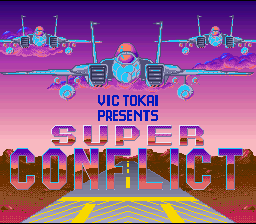Retro Replay Review
Gameplay
Super Conflict delivers a deeply strategic experience that feels like chess magnified across a sprawling battlefield. On a hexagonal grid, each move counts: players must anticipate enemy advances, leverage terrain advantages, and orchestrate multi-unit maneuvers to outwit the opposing force. The core objective—capturing or destroying the enemy Flag Unit—provides a clear, high-stakes goal that keeps tension running from the opening move to the final stand.
(HEY YOU!! We hope you enjoy! We try not to run ads. So basically, this is a very expensive hobby running this site. Please consider joining us for updates, forums, and more. Network w/ us to make some cash or friends while retro gaming, and you can win some free retro games for posting. Okay, carry on 👍)
The variety in unit types—infantry, tanks, aircraft, and naval vessels—adds layers of tactical depth. Infantry can seize cities for repairs and resources, tanks dominate open plains, aircraft provide crucial air superiority, and ships control coastal zones. Constructing factories in advanced scenarios further expands strategic possibilities, allowing players to reinforce depleted ranks or pivot their approach midway through a match.
With five skill levels, Super Conflict scales gracefully from forgiving tutorials to punishing challenges where the introduction of the Flag Ship raises the stakes even higher. The AI adapts to each setting, offering budding commanders an accessible entry point while testing veterans with late-game pressure. Multiplayer skirmishes intensify the cat-and-mouse dynamic, turning every decision into a potential game-changer.
Graphics
Visually, Super Conflict opts for clarity over flash, presenting a clean, top-down perspective where every hexagon and unit icon is immediately legible. Terrain types—forests, mountains, plains, rivers—are distinct without being distracting, ensuring that strategic considerations stay front and center. Subtle color-coding differentiates Blue and Red forces, making it easy to track front lines even in the heat of battle.
Unit sprites are modest but purposeful: tanks roll into position with a brief animation, aircraft icons shift direction as they redeploy, and naval vessels glide along coastal hexes. These small touches lend life to the battlefield without overwhelming the screen. When units attack or take damage, simple but effective visual cues—explosion puffs, flashing health bars—keep you informed of the ebb and flow of combat.
The user interface wraps around the map with minimal fuss. Contextual menus pop up when selecting units or structures, providing clear options for movement, attack, repair, or production. A compact minimap offers a bird’s-eye glimpse of the entire theater, helping players plan long-range strategies. Though not cutting-edge by modern AAA standards, the graphics serve the gameplay exceptionally well, prioritizing functionality and readability.
Story
Super Conflict doesn’t lean on an elaborate narrative but instead frames its scenarios as tactical engagements in a generic global standoff. Each mission briefing outlines objectives—capture the enemy flag, hold key cities, or repel an armored thrust—immersing players in the cold logic of strategic warfare. The lack of a sprawling storyline keeps the focus squarely on tactics and resource management.
That said, scenario design injects variety and context. Early missions pit you in simulated border skirmishes, teaching basic mechanics and terrain usage. Mid-game encounters feature amphibious landings and air raids, challenging you to coordinate across land, sea, and air. The highest difficulty levels introduce multi-front assaults and the ominous Flag Ship, transforming routine captures into desperate last stands.
While you won’t find character-driven cutscenes or branching dialogue trees, Super Conflict’s narrative is written across the battlefield. The silent push and pull of front lines, the sudden breakthrough in enemy defenses, and the climactic charge to seize the opposing flag coalesce into a gripping war story—one authored by your decisions and shaped by each strategic victory or defeat.
Overall Experience
Super Conflict shines as a cerebral strategy title that rewards patience, foresight, and adaptability. Its chess-like simplicity in rules belies a depth of tactics that can keep players engaged for dozens of hours. Whether you’re fine-tuning a defensive choke point or orchestrating a pincer movement, the satisfaction of outmaneuvering a crafty opponent never wanes.
The learning curve is approachable yet substantial. Newcomers will appreciate the gradual introduction of mechanics—repairing units in cities, capturing airfields, and eventually building factories—while veterans can dive straight into high-difficulty skirmishes or multiplayer showdowns. Replayability is strong, thanks to varied terrain setups, scenario objectives, and the unpredictable nature of human opponents online.
Though modest in its audiovisual presentation, Super Conflict excels where it matters most: delivering a robust, intellectually stimulating war game that challenges your strategic instincts. If you crave a hex-based battlefield where every decision ripples across the map, this title is a compelling choice for both solo commanders and competitive tacticians.
 Retro Replay Retro Replay gaming reviews, news, emulation, geek stuff and more!
Retro Replay Retro Replay gaming reviews, news, emulation, geek stuff and more!









Reviews
There are no reviews yet.